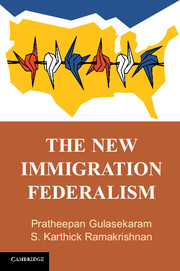Book contents
- Frontmatter
- Dedication
- Contents
- List of Figures and Tables
- Acknowledgments
- 1 Introduction
- 2 Setting the Stage for the New Immigration Federalism
- 3 Rise of Restrictive Legislation and Demographic Arguments of “Vital Necessity”
- 4 A Political Theory of Immigration Federalism: The Polarized Change Model and Restrictive Issue Entrepreneurs
- 5 A Shifting Tide in 2012: Pro-Integration Activists Gain the Upper Hand
- 6 Implications for Legal Theory on Federalism and Immigration Law
- 7 Immigration Federalism Is Here To Stay
- Appendix A Statistical Analysis of Restrictive Local Ordinances
- Appendix B Statistical Analysis of Restrictive State Laws
- Appendix C Statistical Analysis of State Immigrant Integration Laws
- Notes
- Index
4 - A Political Theory of Immigration Federalism: The Polarized Change Model and Restrictive Issue Entrepreneurs
Published online by Cambridge University Press: 05 November 2015
- Frontmatter
- Dedication
- Contents
- List of Figures and Tables
- Acknowledgments
- 1 Introduction
- 2 Setting the Stage for the New Immigration Federalism
- 3 Rise of Restrictive Legislation and Demographic Arguments of “Vital Necessity”
- 4 A Political Theory of Immigration Federalism: The Polarized Change Model and Restrictive Issue Entrepreneurs
- 5 A Shifting Tide in 2012: Pro-Integration Activists Gain the Upper Hand
- 6 Implications for Legal Theory on Federalism and Immigration Law
- 7 Immigration Federalism Is Here To Stay
- Appendix A Statistical Analysis of Restrictive Local Ordinances
- Appendix B Statistical Analysis of Restrictive State Laws
- Appendix C Statistical Analysis of State Immigrant Integration Laws
- Notes
- Index
Summary
In the immigration sphere, claims of demographic necessity and public policy imperatives can sometimes shield other practical and political realities. In Chapter 3, we took a hard look at the recent resurgence of state and local immigration lawmaking, describing the types of restrictionist policies that captured the national agenda from 2004 to 2011, and assessed the merits of the “necessity” narrative as found in many journalistic and scholarly accounts – that the combination of demographic pressures from new patterns of migration, combined with federal inaction, created irresistible pressure for states and localities to act. Our analysis suggests that those justifications do not hold much water, either theoretically or empirically. Here, we turn to the other surprising finding from our quantitative investigation – that political contexts and partisanship matter in immigration federalism, and are salient regardless of the underlying demographic or policy realities facing a state or locality.
While we show that partisanship has a statistically stronger relationship than do various demographic factors in explaining legislative change, perhaps a more interesting question is how these political factors actually function to produce such policy expressions. After all, on almost every hot-button legislative topic it is often easy to blame outcomes on politics or political factors. As such, the kinds of robust political explanations we offer here seek to go beyond ad hoc pronouncements on the importance of politics, which have pointed to disparate factors such as political interest groups, legacies of Jim Crow, and racial gaps between voters and residents.
Instead, we use the conclusions drawn in Chapter 3 to develop an overarching model to replace conventional explanations, accounting for the specific context of immigration discourse. This “polarized change” model of subnational immigration regulation proffers our theory on why partisan debates specifically influence immigration policy, and how the political process has shaped both federal and state legislative efforts during this new surge in immigration federalism. This new model, grounded in theoretical frameworks provided by legal and political science scholarship, accounts for our empirical findings on partisanship and demography. It also incorporates qualitative evidence gathered from news reports, interviews, and congressional dynamics, which highlight the work of selected policy activists in immigration law.
The glaring theoretical defect with the conventional account of state and local immigration action is that it conceptually separates the precondition of federal inaction from the consequence of state and local action that fills the federal legislative void.
- Type
- Chapter
- Information
- The New Immigration Federalism , pp. 87 - 118Publisher: Cambridge University PressPrint publication year: 2015



